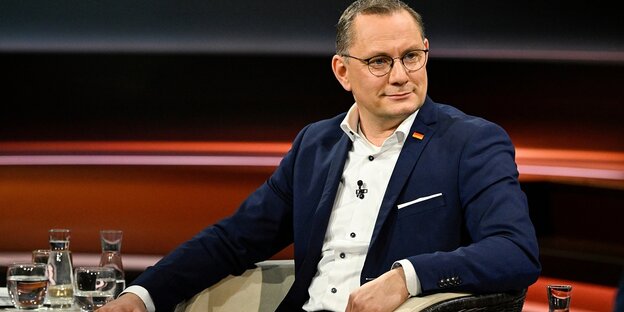Millions of people demonstrate against the AfD. Meanwhile, ARD, ZDF and company put their party leader in the spotlight. The stations thus fail in their mission.

AfD leader Tino Chrupalla on Markus Lanz's ZDF program Photo: Markus Hertrich/ZDF
For weeks, millions of people in Germany have taken to the streets to protest against the AfD. However, public broadcasting in particular seems to be in love with AfD chief Tino Chrupalla. He was first invited at the end of January by Sandra Maischberger, on Sunday for the interview of the week on Deutschlandfunk and then also by Markus Lanz on Tuesday evening. His colleague Leif-Erik Holm was even offered a prime-time platform on “Hart aber fair” on Monday.
Those responsible like to justify this decision with the argument that the AfD is a democratically elected party. Therefore, it must also be sufficiently represented on talk shows. In fact, public broadcasting is subject to the principle of equal opportunities between the parties. What is often overlooked is that this principle applies to an institution's entire program and not to each individual format. Thus, no one is obliged to invite AfD politicians to the show.
Instead, under the State Media Treaty, ARD, ZDF & Co are obliged to do something else: protect respect for human dignity and strengthen respect for life, liberty and the opinions of others. The fact that the AfD questions these values has already been legally proven several times. In six states as well as at the federal level, the party is considered a suspected far-right party, and in Saxony, Saxony-Anhalt and Thuringia, as “a certain far-right effort”. Recently, the Cologne Administrative Court published a decision according to which the Office for the Protection of the Constitution can continue to classify the Junge Alternative as such. Democratically elected does not necessarily mean democratic.
Little confrontation
It was to be expected that Chrupalla would not want to see this. In Lanz she claimed that the decision to create the AfD youth organization was simply another attempt to politically abuse the Office for the Protection of the Constitution to keep the opposition small shortly before the regional elections. A few hours earlier it was learned that participants in an Alternative Youth walk had spoken wonderfully about the ghettos and labor camps for immigrants.
Instead of “putting the AfD leader on the subject,” as so many fans of Habermas’s “power of the best argument” demand these days, Lanz took a welcoming path. “There are people on this program who speak in a much more extreme way than you,” the moderator told Chrupalla and then emphasized that he knew “many” members of the moderate party. It was a desperate attempt to find the moderate, sensible side of the AfD somewhere between the cracks of the couch. As if it would be easier to convince them with good arguments.
In Lanz, Chrupalla once again perfectly demonstrated that this ideal idea is already quite naive. She skillfully avoided questions, turned accusations around and turned the facts upside down. In the end, Lanz stated with resignation: “Today everything revolves around you, Mr. Chrupalla!” The show was originally supposed to be about economics. Instead, Chrupalla had the opportunity to present himself and his party as victims for another 75 minutes.
An argument against excluding AfD members is: one should not play into the victim myth. Lanz has shown that if you invite them, you do the same. When Chrupalla complained to the moderator about being called a “parasite” and a “pied piper,” he agreed with him, saying, “We shouldn't talk about each other like that.” All that was missing was for him to gently caress her head.